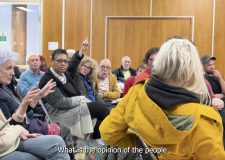Drug consumption room plans for Brighton and Hove dropped
Plans for drug consumption rooms across Brighton and Hove have been dropped.
The controversial policy to offer addicts a safe place to use heroin, crack and cocaine was adopted as an idea by the Independent Drugs commission for Brighton and Hove 12 months ago.
It was claimed that regular contact would take drug use off the street and make it easier to monitor, leading to a reduction in drug-related deaths.
But, after receiving a mixed response from policy makers and the wider public, the plan has now been dropped with advocates claiming it was due to legal and budgetary reasons.
The announcement was made as the commission, which is led by award-winning crime author Peter James and former government drugs tsar Mike Trace, announced it’s final report today (Tuesday May 13) in Brighton’s Jubilee Library.
The final report, published today, said: “Our specific recommendation for the local authorities to examine the feasibility of opening a consumption room was treated with due seriousness.
“The city council and Sussex Police established a working group that looked at the need, likely impact, legal situation, and practical considerations.
“Their conclusion was that a consumption room was not a priority for Brighton and Hove at this time – the working group was convinced by the international evidence on the potential benefit from these facilities, but thought that they would have little impact on the types of factors that were contributing to deaths
in the city.
“Members of the working group were also concerned at the cost implications,
in a time of budget pressure, and also advice from the Home Office that opening such facilities would contravene UK law.”
Mr James, the commission chairman, said: “My own personal view is that people are always going to take drugs. Until there is some radical change it’s going to continue happen.”
Mr James added that 80% of the crime that happened in the city was drug related, much of it lower-level crime such as shoplifting, as this was the only way addicts could feed their £50-a-day habits.
However he said there were “not only legal issues but also budgetary constraints”, adding: “I personally believe that it could be a major step forward”.
Speaking at the meeting, Mr Trace said there had been difficulties from Whitehall as government ministers had reminded those locally of the legal situation in prescribing prohibited drugs.
Despite the benefits of being able to provide addicts regular support and care, Mr Trace said health workers working out of consumption rooms would technically be at risk of arrest from police.
However he said there were precedences which showed officers could ignore known offences if it resulted in greater public safety.
Brighton Pavilion MP Caroline Lucas, who set up the commission, said she was pleased that the idea was at least discussed.
Speaking generally, Dr Lucas said she was pleased that the city’s response to the wider issue had changed since she first brought the body together two years ago.
Key recommendations include a call for more training for people to be able to administer a life-saving overdose antidote; more integrated services for people who have both mental health problems and drug addiction; and for a separation between drug services for young people and adults so that younger users don’t have to mix with more established users.
The report said there had been some real areas of progress, such as expanding the public education programme; increasing the network of buddies and champions; opening of access clinics; and the expansion of the independent recovery community.
It also noted that provisional figures showed there were 32-35 drug related deaths for 2012/13 – an increase compared with 2011/12 but significantly below the average recorded during the recent ten years.
Speaking after the meeting, Dr Lucas said: “Drugs policy should be founded on the over-riding principle of reducing harm, both for users themselves and for wider society; any approach has to be led by the evidence about what works in practice.
“The commission in its bold set of recommendations has helped to further embed evidence-based approaches to drugs policy, prevention and treatment and it is why I offer my sincere thanks to its members who have given their professional time over the last two years.
“They have shown the way for future UK drugs policy – a rational non-alarmist policy where health, welfare, harm reduction and decisions based on evidence are deservedly the drivers in tackling drug addiction.
“Thank you to the city’s public agencies for their support and cooperation in this project and the professionalism of their staff who are making a life-saving difference on the front line.”




















